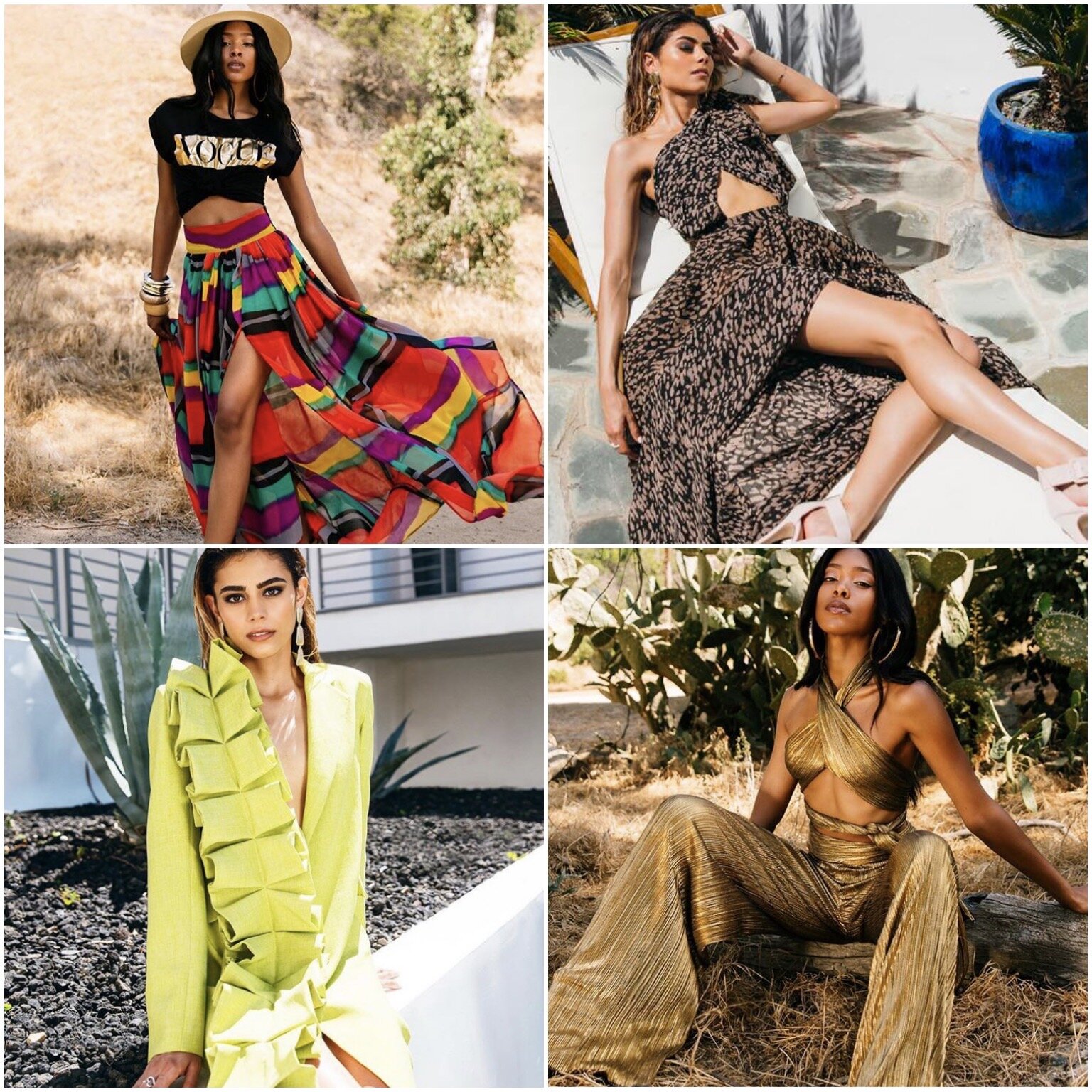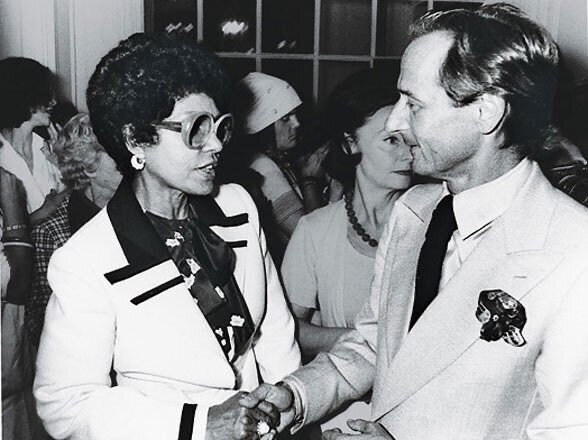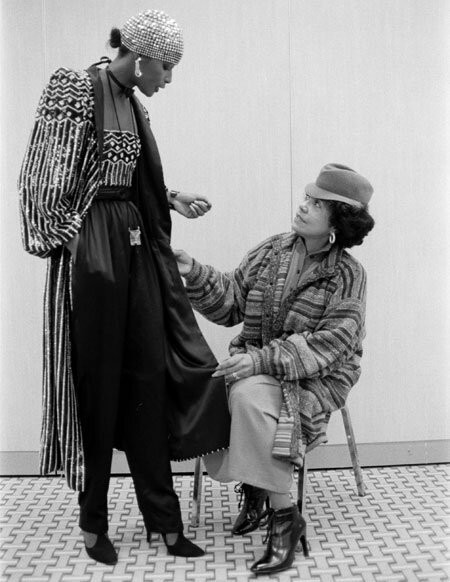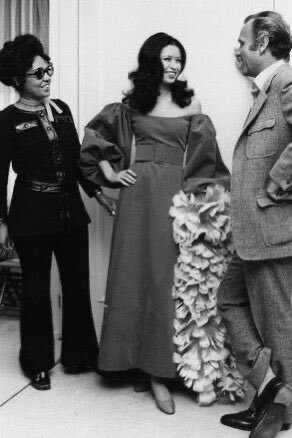WRITTEN BY SHARRA GREENE
Pioneer and Curator of Ebony Fashion Fair, Eunice Walker Johnson sitting front row during fashion presentations: a rarity during her era in the industry and the photos say so much.
As expressive and beautiful the phenomenon that is fashion can be, there’s also such a strong sense of secrecy and exclusivity concerning the industry. Anyone who wants in has experienced this in one way or another. From authorities in fashion refusing to hire people of a certain look, race, religion, or social class, down to giving no front row seats at shows for those who aren’t deemed “good enough” over trivial matters, even down to how secretive individuals can be when it comes to plugging each other with valuable resources , the “crabs in a barrel” attitude that often exudes from many of those who are apart of the fashion industry is virtually impossible to miss; and if you let it, it can leave you feeling discouraged, disheartened, and underrepresented. Thankfully, we’re living in a time where those who came before us have walked so we could run, and it’s becoming easier to still show up and kill it in this industry, in your own right.
Whether you’re an aspiring influencer, designer, model, stylist, or even if you’re just a lover of fashion culture, I’ve found on my journey just how important it is to unapologetically offer your 2 cents, despite voices in the industry constantly trying to control what is perceived as worthy, acceptable, and appealing and what is not. You never know how your perspective will positively influence and inspire others along their own journey. Here are a few ways to keep making your presence known…
IF YOU CAN’T JOIN THEM, CREATE YOUR OWN
This has been the approach that some of fashion’s most iconic trailblazers and legends in the making have taken, and are still taking. When we abandon our need to be accepted by everyone we feel is important, that’s often when our true calling makes itself known. As a young black woman who’s building a career in fashion, it’s no secret that throughout history, there have been many doors closed for people who look like me. However, I’m so blessed to be pursuing fashion in a time where those who came before me have knocked down some doors and in a sense, tossed me the key.
For context, the LEGENDARY AND ICONIC Ebony Fashion Fair Curator Eunice Walker took initiative to highlight blacks in fashion during a time when the mainstream tastemakers in the industry were ignoring us. After having a dream of writing for Vogue deferred, Editor in Chief of Fashion Bomb Daily, Claire Sulmers (if you read here often, you already know she’s my fav!) utilized her growing online presence to create “her own Vogue” in so many words, building and maintaining a unique space for multicultural fashion to be celebrated. “First you ask, then you take.”, she says.
Eunice Walker Johnson’s Ebony Fashion Fair exhibit, highlighting black up and coming designers of her time.
From Instagram born, profitable fashion brands to influencers who found their tribe, went viral, and never looked back… we live in an era where when we can’t join someone’s movement, we can create our own and be just as, if not even more successful, and a lot of industry vets are upset about it. But there’s honestly no going back… due to the way we consume our information and entertainment. (internet, social media, etc.) There’s an array of ways to consistently contribute your perspective in any industry, especially fashion.
Seeing a lack of representation in fashion that moves you to want to act on it? Instead of wasting time begging and waiting for certain opportunities, be the change and create your own. It can start with establishing your own movement, whether it be via an online presence where you air your grievances on the issues that move you on a podcast, blog, IGTV, etc. or even creating your own line of clothing and making sure we see black women and women of color in EVERY. SINGLE. campaign. Through experience, I’m learning that it gains momentum when you continue to create your content, share your style, share your opinions, and continue to show up and speak up despite whoever’s trying to silence you. You’d be surprised how many people identify with your voice when you use it. You’d also be surprised how many people are willing to invest in your movements.
SPEAK UP, NEVER BE AFRAID TO PLUG YOURSELF
Me introducing myself to legendary stylist Misa Hylton at the Convos with Claire networking event in December 2018.
With fashion being such a competitive industry, it’s important to know how to plug yourself. This is probably the biggest lesson I’ve learned thus far when it comes to my business. When I first started styling back in 2014, I was not as confident as I am now, which probably caused me to fumble a few bags in the process. It didn’t help that I’m naturally introverted, believe it or not. But over time, I’ve learned when to break out of my shell and handle business because if I don’t speak for my brand, no one else will.
When you walk into a room hoping to make your mark, Ive learned that it’s important to remember that people don’t read minds. They’re not aware of the gifts you possess, and until you speak up and let them know, you risk missing out on building meaningful connections with others and further establishing your brand. If you’re looking to get better at representing yourself, practicing your elevator pitch and testing it out at networking events or when you meet new people can help you learn to leaving a lasting impression at a moment’s notice.
SUPPORT A MOVEMENT BEFORE IT’S “MOVING”
It pisses me off to see the countless dope brands and creatives in fashion who offer a fresh point of view and quality work getting knocked off, ripped off, and overlooked. I’m sure you’ve heard of the saying “nobody is messing with your movement until it’s moving” but it can be challenging to gain momentum when people don’t support you just because you haven’t “made it” yet, whatever that means. That’s why I’ve recently been making a point to support my fellow small business owners, minority owned businesses, and an array of other groups in fashion who constantly seem to get put on the back burner.
When you choose to support a label, or brand before it has completely taken off and gone mainstream, not only do you gain credibility to whoever’s watching as a trendsetter and not a follower, but you also gain leverage by supporting at the beginning stages because it often leads to strong partnerships with the owners of these companies that others missed out on because they simply jumped on the bandwagon later on down the road. I actually just recently interviewed a BOMB micro influencer who executes this concept amazingly. Stay tuned, my Q&A with her is coming to the blog next week! But back to the point, consider taking on ambassadorships or even simply purchasing from more of the brands that are slept on, it can help you make your mark in the long run, in more ways than one.
Hope you got something from this post! New content on its way to the blog very soon! Stay tuned safe & Stay tuned!



















